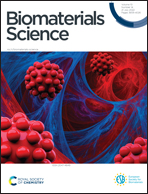Gram-selective antibacterial peptide hydrogels†
Abstract
The human microbiome plays fundamental roles in human health and disease. However, widely used broad-spectrum antibiotics severely disrupt human-related microbial communities, eventually leading to resistant bacteria, posing a growing threat to global medical health. Antimicrobial peptides (AMPs) are promising antimicrobial agents that barely cause bacterial resistance. Excellent broad-spectrum antimicrobial activities have been achieved using hydrogels self-assembled from AMPs, but there is still a lack of AMP hydrogels that can target Gram-positive and Gram-negative bacteria. Herein, several hydrogels self-assembled from AMPs, termed IK1, IK3, and IK4, were designed and synthesized. In vitro antibacterial results indicated that the IK1 and IK4 hydrogels specifically targeted Gram-positive and Gram-negative bacteria, respectively, while the IK3 hydrogel targeted both Gram-positive and Gram-negative bacteria. The desired broad-spectrum or Gram-selective AMP hydrogels are believed to be obtained through the rational design of the hydrophilicity, hydrophobicity, and charge properties of the peptide molecules. Good in vivo Gram-selective antibacterial properties and the ability to promote wound healing have been demonstrated via treating mouse wound models with these AMP hydrogels. We believe that these Gram-selective AMP hydrogels could potentially have important applications in treating common recurring infections.



 Please wait while we load your content...
Please wait while we load your content...